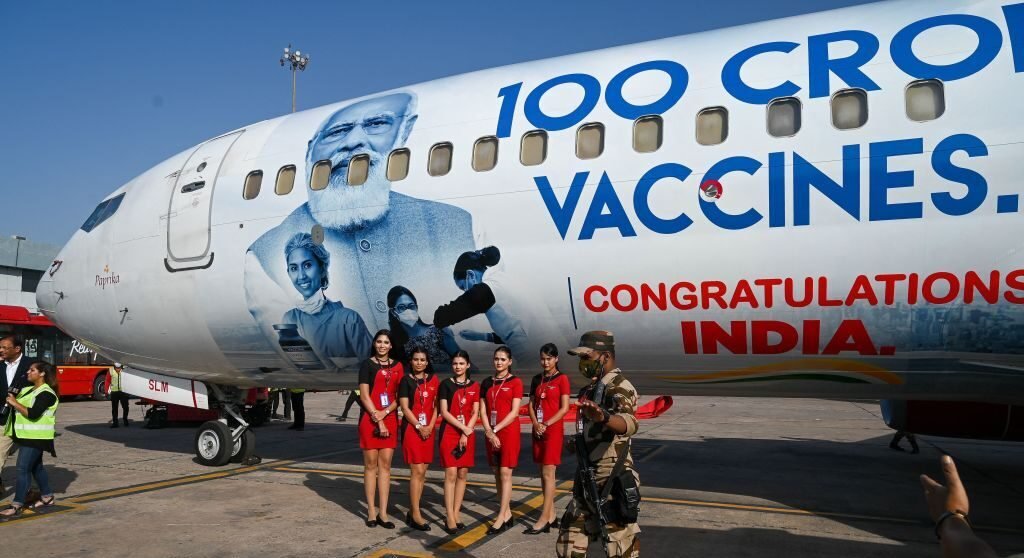
New COVID-19 International Air Travel Rules Announced by Biden Administration
Air stewardesses pose for a picture during the unveiling of a SpiceJet Boeing 737 design celebrating India’s administering its billionth Covid-19 vaccine dose, during an unveiling event at the Indira Gandhi International Airport in New Delhi on Oct. 21, 2021. (Prakash Singh/AFP via Getty Images)
By REENA BHARADWAJ
WASHINGTON (ANI) – The Biden administration on Oct. 25 announced new COVID-19 international air travel rules starting from Nov. 8, lifting severe travel restrictions on China, India and much of Europe. Starting on Nov. 8, foreign national air travelers to the United States will be required to be fully vaccinated and to provide proof of vaccination status prior to boarding an airplane to fly to the United States, with only limited exceptions, according to a U.S. Department of State release.
The U.S. Centers for Disease Control and Prevention has determined that for the purposes of entry into the United States, vaccines accepted will include those that are U.S. Food and Drug Administration approved or authorized, as well as vaccines with an emergency use listing from the World Health Organization, which includes Pfizer, Moderna, Johnson & Johnson, AstraZeneca, Sinopharm and Sinovac vaccines.
As per the guidelines, mixing and matching of approved shots will be permitted.
Fully vaccinated air travelers will continue to be required to show documentation of a pre-departure negative viral test from a sample taken within three days of travel to the United States before boarding. That includes all travelers – U.S. citizens, lawful permanent residents such as green cardholders, and foreign nationals.
To further strengthen protections, unvaccinated travelers – whether U.S. citizens, LPRs, or the small number of excepted unvaccinated foreign nationals – will now need to show documentation of a negative viral test from a sample taken within one day of travel to the United States, read the release.
The travel advisory by the Department of State also said that both U.S. citizens and foreign nationals who are fully vaccinated should travel with proof of their vaccination status to provide to their airline prior to departure for the United States.
That proof of vaccination should be a paper or digital record issued by an official source and should include the traveler’s name and date of birth, as well as the vaccine product and date(s) of administration for all doses the traveler received, added the advisory.
While vaccination proof is not required for U.S. citizens and LPRs, fully vaccinated U.S. citizens and LPRs (and their dependents) will continue to be able to show documentation of a negative viral test from a sample taken up to three days before departure to the United States. They must present proof of vaccination to qualify for the three-day test window. U.S. citizens and LPRs who are unable to show that they are fully vaccinated will have to show documentation of a negative viral test taken no more than one day before departure.
However, children under 18 are exempted from the vaccination requirement for foreign national travelers, given both the ineligibility of some younger children for vaccination, as well as the global variability in access to vaccination for older children who are eligible to be vaccinated, said the advisory.
Regarding testing requirements for children, the advisory added that children between the ages of 2 and 17 are required to take a pre-departure test.
If a child is not fully vaccinated and traveling with a fully vaccinated adult, they can show proof of a negative viral test from a sample taken within three days before departure (consistent with the timeline for fully vaccinated adults).
If an unvaccinated child is traveling alone or with unvaccinated adults, they will have to show proof of a negative viral test from a sample taken within one day of departure.
While children under 2 years of age are exempted from the testing requirement, CDC recommends a pre-departure test for these children whenever possible.
The test must be administered no more than three calendar days before the date of the international flight to the United States.
This new global travel system replaces the existing country-by-country restrictions, putting in place a consistent approach worldwide.




